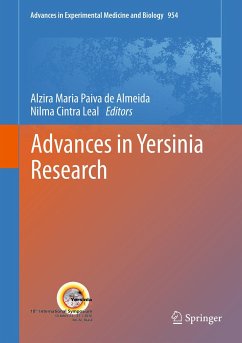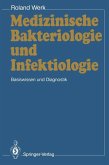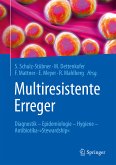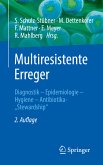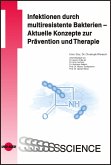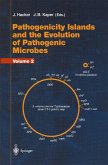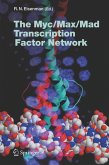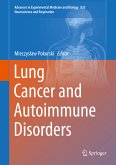Advances in Yersinia Research (eBook, PDF)
Redaktion: De Almeida, Alzira Maria Paiva; Leal, Nilma Cintra
Sofort per Download lieferbar

Advances in Yersinia Research (eBook, PDF)
Redaktion: De Almeida, Alzira Maria Paiva; Leal, Nilma Cintra
- Format: PDF
- Merkliste
- Auf die Merkliste
- Bewerten Bewerten
- Teilen
- Produkt teilen
- Produkterinnerung
- Produkterinnerung

Hier können Sie sich einloggen

Bitte loggen Sie sich zunächst in Ihr Kundenkonto ein oder registrieren Sie sich bei bücher.de, um das eBook-Abo tolino select nutzen zu können.
This book is a collection of articles written by prominent scientists who gathered in the city of Recife, Brazil, 23-27 October 2010, celebrating the 10th International Symposium on Yersinia. The event is held every four years in a different country and for the Yersinia 2010, an interesting and updated program covering advances in research in Yersiniae was organized. The major advances achieved over the past four years since the last symposium held in Lexington, USA in 2006 were divided into eight chapters: Epidemiology, Clinical, Diagnostic and Therapeutic aspects; Ecology and Modeling;…mehr
- Geräte: PC
- ohne Kopierschutz
- eBook Hilfe
- Größe: 8.91MB
![Medizinische Bakteriologie und Infektiologie (eBook, PDF) Medizinische Bakteriologie und Infektiologie (eBook, PDF)]() Roland WerkMedizinische Bakteriologie und Infektiologie (eBook, PDF)42,99 €
Roland WerkMedizinische Bakteriologie und Infektiologie (eBook, PDF)42,99 €![Multiresistente Erreger (eBook, PDF) Multiresistente Erreger (eBook, PDF)]() Multiresistente Erreger (eBook, PDF)39,99 €
Multiresistente Erreger (eBook, PDF)39,99 €![Multiresistente Erreger (eBook, PDF) Multiresistente Erreger (eBook, PDF)]() Multiresistente Erreger (eBook, PDF)42,99 €
Multiresistente Erreger (eBook, PDF)42,99 €![Infektionen durch multiresistente Bakterien - Aktuelle Konzepte zur Prävention und Therapie (eBook, PDF) Infektionen durch multiresistente Bakterien - Aktuelle Konzepte zur Prävention und Therapie (eBook, PDF)]() Christoph WenischInfektionen durch multiresistente Bakterien - Aktuelle Konzepte zur Prävention und Therapie (eBook, PDF)24,80 €
Christoph WenischInfektionen durch multiresistente Bakterien - Aktuelle Konzepte zur Prävention und Therapie (eBook, PDF)24,80 €![Pathogenicity Islands and the Evolution of Pathogenic Microbes (eBook, PDF) Pathogenicity Islands and the Evolution of Pathogenic Microbes (eBook, PDF)]() Pathogenicity Islands and the Evolution of Pathogenic Microbes (eBook, PDF)112,95 €
Pathogenicity Islands and the Evolution of Pathogenic Microbes (eBook, PDF)112,95 €![The Myc/Max/Mad Transcription Factor Network (eBook, PDF) The Myc/Max/Mad Transcription Factor Network (eBook, PDF)]() The Myc/Max/Mad Transcription Factor Network (eBook, PDF)112,95 €
The Myc/Max/Mad Transcription Factor Network (eBook, PDF)112,95 €![Lung Cancer and Autoimmune Disorders (eBook, PDF) Lung Cancer and Autoimmune Disorders (eBook, PDF)]() Lung Cancer and Autoimmune Disorders (eBook, PDF)72,95 €
Lung Cancer and Autoimmune Disorders (eBook, PDF)72,95 €-
-
-
Dieser Download kann aus rechtlichen Gründen nur mit Rechnungsadresse in A, B, BG, CY, CZ, D, DK, EW, E, FIN, F, GR, HR, H, IRL, I, LT, L, LR, M, NL, PL, P, R, S, SLO, SK ausgeliefert werden.
- Produktdetails
- Verlag: Springer New York
- Seitenzahl: 367
- Erscheinungstermin: 11. Juli 2012
- Englisch
- ISBN-13: 9781461435617
- Artikelnr.: 37677615
- Verlag: Springer New York
- Seitenzahl: 367
- Erscheinungstermin: 11. Juli 2012
- Englisch
- ISBN-13: 9781461435617
- Artikelnr.: 37677615
- Herstellerkennzeichnung Die Herstellerinformationen sind derzeit nicht verfügbar.
